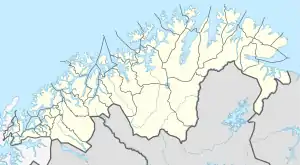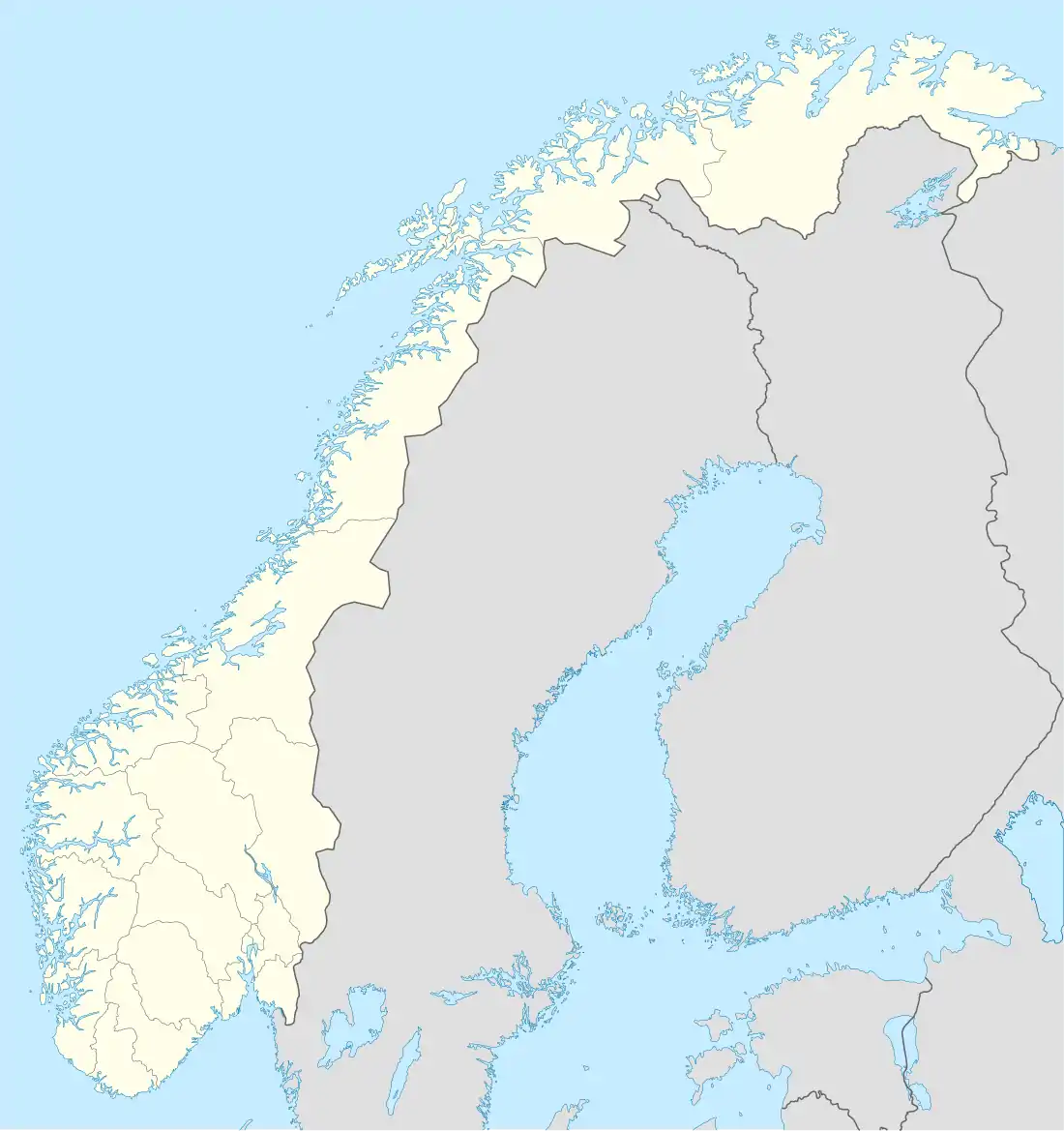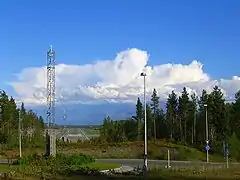Bardufoss
Bardufoss is an urban area and commercial centre in Målselv Municipality in Troms og Finnmark county, Norway. The three villages of Andselv, Andslimoen, and Heggelia together form the Bardufoss area. Bardufoss is located in the Målselvdalen valley near the confluence of the Barduelva and Målselva rivers. It is located about 82 kilometres (51 mi) north of the town of Narvik and about 70 kilometres (43 mi) south of the city of Tromsø. Bardufoss Airport is located here. The 2.96-square-kilometre (730-acre) urban area has a population (2017) of 2,545 which gives it a population density of 860 inhabitants per square kilometre (2,200/sq mi).[1]
Bardufoss | |
|---|---|
Urban area | |
.jpg.webp) View of the Bardufoss area | |
 Bardufoss Location of the village  Bardufoss Bardufoss (Norway) | |
| Coordinates: 69.0645°N 18.5152°E | |
| Country | Norway |
| Region | Northern Norway |
| County | Troms og Finnmark |
| District | Midt-Troms |
| Municipality | Målselv Municipality |
| Area | |
| • Total | 2.96 km2 (1.14 sq mi) |
| Elevation | 68 m (223 ft) |
| Population (2017)[1] | |
| • Total | 2,545 |
| • Density | 860/km2 (2,200/sq mi) |
| Time zone | UTC+01:00 (CET) |
| • Summer (DST) | UTC+02:00 (CEST) |
| Post Code | 9325 Bardufoss |
Military

Bardufoss has a civilian and military airport, Bardufoss Air Station, suitable for landing bomber aircraft, fighter jets such as F-16s, and other heavy planes. Bardufoss was also the home of the Norwegian Army's 6th division (dissolved in 2009).
There is a street in Bardufoss that is named General Fleischers Veg in honour of Carl Gustav Fleischer.
The airport was renamed Snowman International on 19 March 2011 by a Norwegian Minister after a commercial flight landed from Manchester, England, to join the celebrations.
Nature
Bardufoss is covered in flora. The natural forest is mostly made up of Downy birch, Scots pine, aspen and Grey alder. However, Norway spruce has been planted in plantations since the middle part of the 20th century for economic reasons (timber).
Climate
Although not far from the coast, Bardufoss and Målselvdalen is known for a somewhat more continental climate, and hence, colder winters (but with less humidity and little wind) compared to the coastal areas. There is a very reliable snow cover in winter, while summer days often are warmer than in Tromsø.
There is on average 93 days each winter with daily low −10 °C (14 °F) or colder, and 28 days with low −20 °C (−4 °F) or colder. The winter season sees on average 68 days with at least 50 centimetres (20 in) snow cover on the ground, 126 days with at least 25 centimetres (9.8 in) snow cover, and 179 days with at least 5 centimetres (2.0 in) snow cover. In the warm season there is on average 116 days per year when the daily average high reaches 10 °C (50 °F) or warmer and 22 days with daily average high above 20 °C (68 °F). Precipitation is fairly moderate, there is on average 75 days each year with at least 3 millimetres (0.12 in) precipitation and 15 days per year with at least 10 millimetres (0.39 in) precipitation. This is based on data from Met.no with 1971-2000 as base period.[3]
Recent years have seen warming. Six of the monthly record highs are from after 2000. The November record low is from 2019.
| Climate data for Bardufoss 1981-2010 (76 m, extremes 1946-2018) | |||||||||||||
|---|---|---|---|---|---|---|---|---|---|---|---|---|---|
| Month | Jan | Feb | Mar | Apr | May | Jun | Jul | Aug | Sep | Oct | Nov | Dec | Year |
| Record high °C (°F) | 8.9 (48.0) |
9 (48) |
11.9 (53.4) |
17.5 (63.5) |
27.7 (81.9) |
31.1 (88.0) |
33.5 (92.3) |
32.2 (90.0) |
23.7 (74.7) |
20 (68) |
12.2 (54.0) |
10.1 (50.2) |
33.5 (92.3) |
| Average high °C (°F) | −4.2 (24.4) |
−3.6 (25.5) |
0.1 (32.2) |
4.5 (40.1) |
9.7 (49.5) |
14.6 (58.3) |
17.6 (63.7) |
16.2 (61.2) |
11.2 (52.2) |
4.6 (40.3) |
−1.3 (29.7) |
−3.6 (25.5) |
5.5 (41.9) |
| Daily mean °C (°F) | −8.7 (16.3) |
−8 (18) |
−4.9 (23.2) |
0.2 (32.4) |
5.8 (42.4) |
10.6 (51.1) |
13.6 (56.5) |
11.9 (53.4) |
7.2 (45.0) |
1.3 (34.3) |
−5.1 (22.8) |
−7.9 (17.8) |
1.4 (34.5) |
| Average low °C (°F) | −13.1 (8.4) |
−12.4 (9.7) |
−9.9 (14.2) |
−4 (25) |
1.8 (35.2) |
6.6 (43.9) |
9.5 (49.1) |
7.6 (45.7) |
3.2 (37.8) |
−1.9 (28.6) |
−8.8 (16.2) |
−12.1 (10.2) |
−2.8 (27.0) |
| Record low °C (°F) | −36.2 (−33.2) |
−34.8 (−30.6) |
−31.7 (−25.1) |
−25.1 (−13.2) |
−11.2 (11.8) |
−2 (28) |
0.6 (33.1) |
−4 (25) |
−12.4 (9.7) |
−25.5 (−13.9) |
−29.8 (−21.6) |
−38.1 (−36.6) |
−38.1 (−36.6) |
| Average precipitation mm (inches) | 74.6 (2.94) |
57.6 (2.27) |
43.6 (1.72) |
32.3 (1.27) |
34 (1.3) |
38.1 (1.50) |
51.9 (2.04) |
68.7 (2.70) |
73.7 (2.90) |
76.6 (3.02) |
58.6 (2.31) |
71.3 (2.81) |
652 (25.7) |
| Average precipitation days (≥ 1 mm) | 13 | 11 | 9 | 8 | 9 | 8 | 11 | 12 | 13 | 14 | 11 | 13 | 124 |
| Source 1: Meteo Climat[4] | |||||||||||||
| Source 2: eklima/met.no (extremes) | |||||||||||||
References
- Statistisk sentralbyrå (1 January 2017). "Urban settlements. Population and area, by municipality".
- "Bardufoss, Målselv (Troms)". yr.no. Retrieved 19 August 2018.
- "Vanlig Vær Bardufoss" (in Norwegian). met.no. Archived from the original on 30 December 2013. Retrieved 30 December 2013.
- http://meteo-climat-bzh.dyndns.org/listenormale-1981-2010-1-p159.php
External links
| Wikimedia Commons has media related to Bardufoss. |
